https://www.youtube.com/watch?v=qFBTGU7a5_E
Thousands have gathered at a graveyard in Bosnia-Herzegovina to mark the 20th anniversary of the Srebrenica massacre.
About 8,000 Bosnian Muslim men and boys died at the hands of Bosnian Serb forces amid the break-up of Yugoslavia.
Serbian Prime Minister Aleksandar Vucic – whose country backed the Bosnian Serbs – was chased away from the ceremony by a crowd throwing stones.
On Wednesday, Russia vetoed a UN resolution calling the events as genocide – a term that angers Serbia.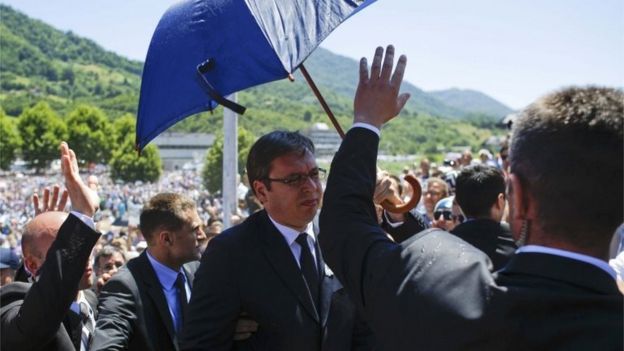
Serbian PM Aleksandar Vucic surrounded by bodyguards at the Potocari Memorial Centre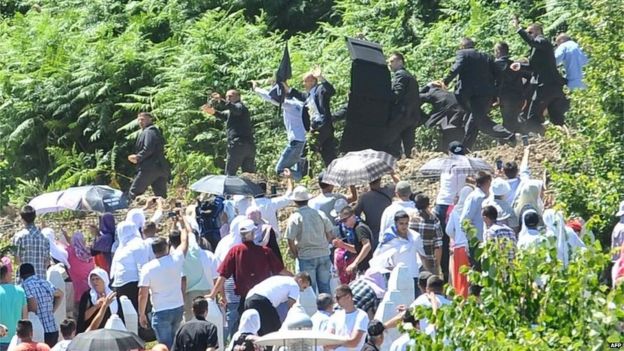 Mr Vucic and his delegation scrambled to their cars after the attack
Mr Vucic and his delegation scrambled to their cars after the attack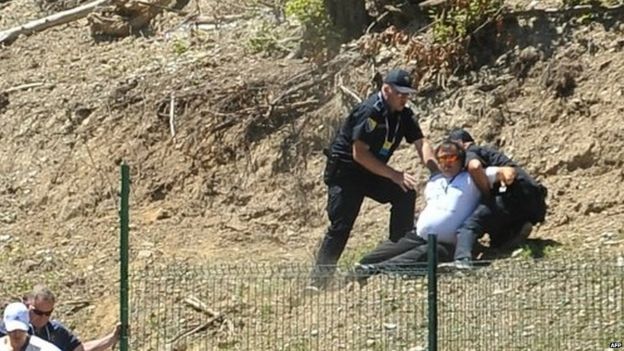 Bosnian police officers arrest a protester suspected of having taking part in the attack on Mr Vucic
Bosnian police officers arrest a protester suspected of having taking part in the attack on Mr Vucic
The Bosnian War saw Bosnian Serb forces, backed by Serbia, fighting the Muslim-led Bosnian government.
In July 1995, thousands seeking shelter in what was supposed to be a UN refuge in Srebrenica were shot dead. It was Europe’s worst atrocity since World War Two.

At the scene: Guy Delauney, BBC News, Potocari, Srebrenica
The commemoration provided a perfect illustration of just how difficult reconciliation can be – in Bosnia and across the region.
Tens of thousands of people came to pay their respects to the victims of Srebrenica and show their solidarity with the people of this much-diminished town. They heard international dignitaries speak of the horror of what had occurred here and how it must never be repeated.
Then former US President Bill Clinton made a specific point of praising the courage of Serbia’s Prime Minister, Aleksandar Vucic, for turning up in the face of hostility from many ethnic-Bosniaks. They are angry that while Serbia has condemned the massacre, it has never used the word genocide to describe what happened.
Sadly, but predictably, Mr Vucic was loudly jeered by many in the crowd. Some even threw objects as he paid his respects in the cemetery. The imam reminded the crowd that it was time to pray. But the anger here remains.
Srebrenica tries to move on from massacre

On Friday, almost 10,000 people took part in an annual peace march, retracing the route of the men and boys who tried to flee Srebrenica as Bosnian Serb forces took control of the town.
A funeral service for more than 100 victims whose remains were recently identified using DNA analysis was also held on Saturday.
Attending the ceremonies, Bill Clinton, the US president at the time, apologised that it had taken so long to end the war, adding: “I never want to see another killing field like this.”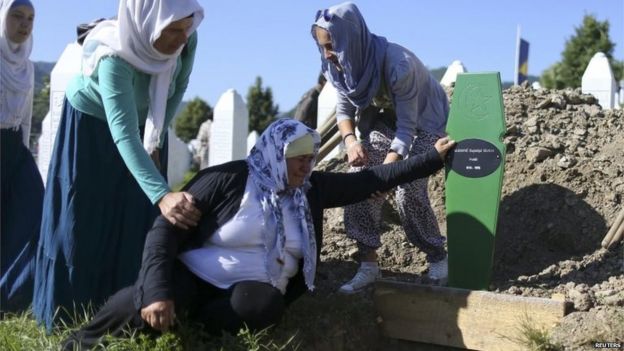
The wounds of the atrocities are still raw in Bosnia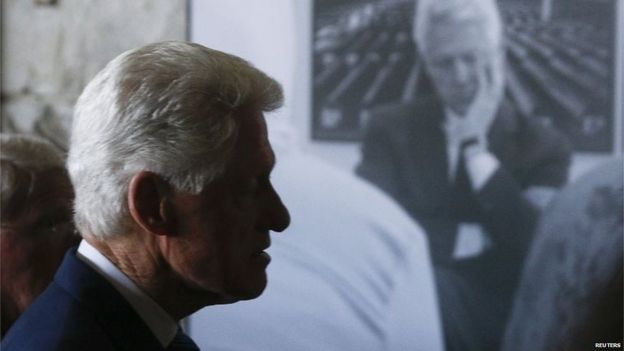 Bill Clinton was president at the time – he apologised it had taken so long to bring the war to an end
Bill Clinton was president at the time – he apologised it had taken so long to bring the war to an end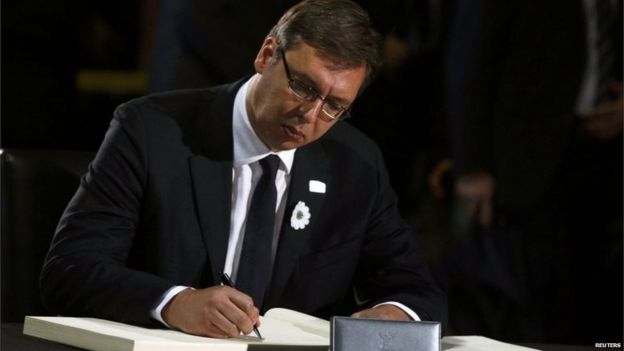 Serbian Prime Minister Aleksandar Vucic, a former ultranationalist who is now pro-Western, condemned the massacre as a “horrible crime”
Serbian Prime Minister Aleksandar Vucic, a former ultranationalist who is now pro-Western, condemned the massacre as a “horrible crime”
Mr Clinton praised Mr Vucic for being there.
In an open letter, Mr Vucic said that “Serbia clearly and unambiguously condemns this horrible crime and is disgusted with all those who took part in it and will continue to bring them to justice”.
Munira Subasic, head of the Association of Srebrenica Mothers, pinned a white and green flower of remembrance on Mr Vucic’s lapel and he signed a book of condolences.
However, later the Serbian leader was heckled by crowds shouting “Allahu Akbar” as he entered to lay flowers. As some chanted “responsibility” and “genocide”, others proceeded to throw objects – reports suggested stones, water bottles and a shoe were among the items used.
Serbian news agency Tanjug suggests he was hit in the head and had his glasses broken. There is no confirmation.
Pictures showed police arresting a man after the incident.
In the run-up to the anniversary, Serbian authorities banned commemorations in the capital Belgrade, after right-wing groups threatened disruption.
Activists had planned to mourn the victims outside the Serb parliament but police responded to plans for counter-demonstrations by banning all gatherings at parliament on Saturday.
Serbia’s Interior Minister Nebojsa Stefanovic said he had taken the decision to guarantee “peace and security in the whole of Serbia”.
Timeline of Srebrenica siege
6-8 July 1995: Bosnian Serb forces start shelling Srebrenica enclave
9 July: Bosnian Serbs step up shelling; thousands of Bosnian Muslim refugees flee to Srebrenica
10 July: Dutch peacekeepers request UN air support after Bosnian Serbs shell Dutch positions. Large crowds of refugees gather around Dutch positions
11 July: More than 20,000 refugees flee to main Dutch base at Potocari. Serbs threaten to kill Dutch hostages and shell refugees after Dutch F-16 fighters bomb Serb positions. Bosnian Serb commander Ratko Mladic enters Srebrenica and delivers ultimatum that Muslims must hand over weapons
12 July: An estimated 23,000 women and children are deported to Muslim territory; men aged 12-77 taken “for interrogation” and held in trucks and warehouses
13 July: First killings of unarmed Muslims take place near village of Kravica. Peacekeepers hand over some 5,000 Muslims sheltering at Dutch base in exchange for the release of 14 Dutch peacekeepers held by Bosnian Serbs
14 July: Reports of massacres start to emerge

The initiator of the planned Belgrade commemoration, Dusan Masic, said it was “scandalous”, and showed “where Serbia is in 2015”.
Fourteen individuals have been convicted at the UN’s International Criminal Tribunal for the Former Yugoslavia (ICTY) in The Hague in relation to the Srebrenica killings.
The former Bosnian Serb army chief, Ratko Mladic, and former Bosnian Serb leader Radovan Karadzic are both on trial at The Hague in separate processes.
They are both accused of crimes relating to the massacre.
The ICTY – and the International Court of Justice – have called the events genocide.
However, at the UN Security Council on Wednesday, Russia’s UN Ambassador Vitaly Churkin said adopting the term “would be counter-productive, would lead to greater tension in the region”.
The vote had been put back a day to allow the US and the UK – which drafted the resolution – to try to persuade Russia not to veto it.
Serbian President Tomislav Nikolic, called it a “great day” for his country.
Source: BBC/++






























